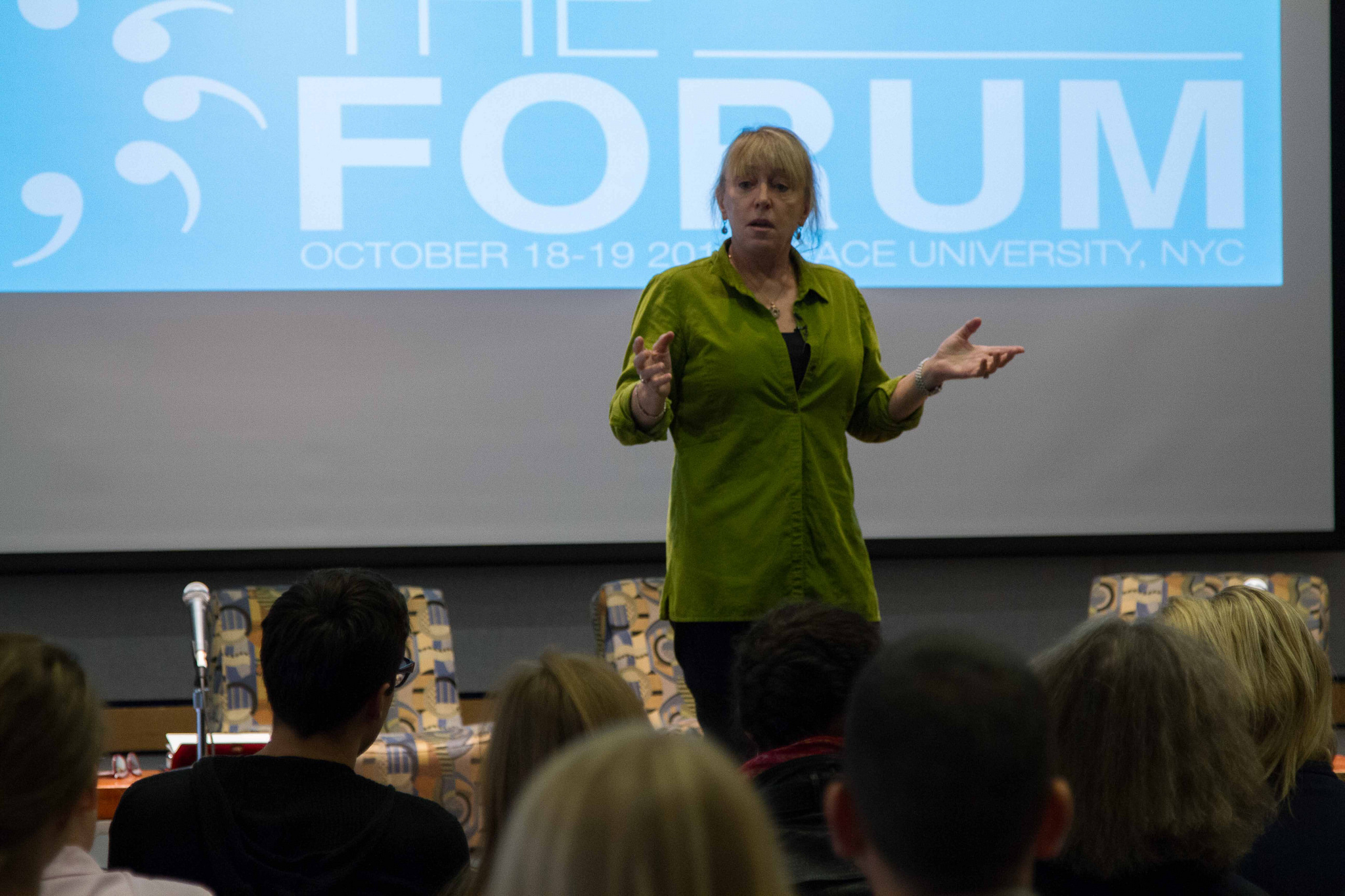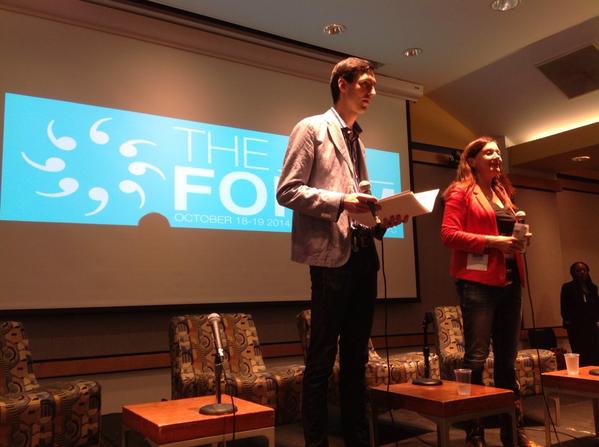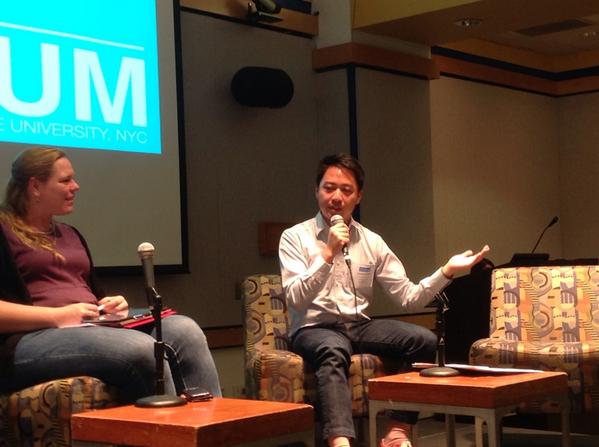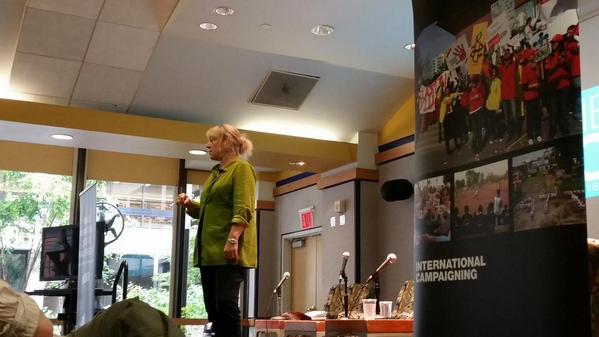Disarmament and Arms Control Campaigners Challenged to Take Gender Seriously

Nobel Peace Prize Laureate Jody Williams delivering keynote address at the 2014 Disarmament Forum at Pace University New York City. Photo: Control Arms.
Activists working on disarmament and arms control need to challenge the belief that violence is inevitable – especially violence by men –and resist the subtle attempts by powerful organizations and people to infer that those who work for peace are somehow weak and “woman-like”, said Jody Williams of the Nobel Women’s Initiative October 17-19, 2014, at Pace University in New York City.
Williams was awarded the Nobel Peace Prize in 1997 along with the International Campaign to Ban Landmines for her successful coordination of the global coalition that served as the “engine of change” on landmines and, in the space of five years, resulted in the Ottawa Treaty, banning Antipersonnel Landmines. Since January 2006, Williams has chaired the Nobel Women’s Initiative that spearheaded the International Campaign to Stop Rape and Gender Violence in Conflict. She has also been a powerful advocate for the prohibition of fully autonomous robotic weapons.
“Gender-based violence should not be portrayed as a ‘woman’s issue’ – it’s humanity’s issue, everybody’s issue,” Williams told the 2014 Disarmament and Arms Control Campaigns Forum, co-hosted by Pace University, the Control Arms coalition and the Women’s International League for Peace and Freedom (WILPF). “Men must use their privilege to challenge and push back against gender discrimination in disarmament.”
The Forum opened with a speech from Felicity Ruby of WILPF, who provided campaigners with an analytical framework for understanding the difference between gender – a social and political construct – and biological sex. She outlined how a gender system shapes, limits and harms men and women, rewarding a competitive, combative masculinity, alien to the temperament of many boys and men, and shunning empathy and diplomacy as “feminine.”
“While you may be ridiculed or dismissed for insisting on its relevance, gender helps explain militarism and the obstacles to disarmament,” she advised campaigners, drawing on her experience coordinating the campaign advocating for the UN Security Council’s landmark Resolution 1325 on Women, Peace and Security.

Dr. Matthew Bolton, assistant professor of political science and Model UN advisor and Anna McDonald, head of Control Arms, welcome 2014 Disarmament Forum participants to Pace University New York City
The weekend featured many other notable speakers from the media, diplomacy, academia and non-profit sector who are working on the intersections between gender and arms, outlining initiatives, such as boycotting all-male panels on disarmament issues and an upcoming UN General Assembly Resolution on Women, Disarmament, Non-proliferation and Arms Control.
Kathi Lynn Austin, a former UN arms investigator and executive director of Conflict Awareness Project spoke about how her gender meant arms traffickers took her less seriously, which enabled her to gather damning evidence against the notorious gun-runner Viktor Bout. Shorna Kay Richards, Deputy Permanent Representative of Jamaica to the UN, spoke about how she refused to be intimidated by the male-dominated diplomatic establishment in multilateral disarmament negotiations.
“Men are expected to be part of military action, which in turns reinforces the construction of violent masculinities,” said Ray Acheson, in her presentation on the intersections between gender and war. Acheson is director of Reaching Critical Will, a disarmament program of WILPF, one of the oldest organizations working on issues of gender equality and peace.
The conference participants were particularly moved by the story of Antonius Wiriadjaja, a local activist and New York University assistant professor of art who was the innocent victim of a drive-by domestic violence shooting in Brooklyn.
“Remember that every statistic of gun violence is a person with a story, like me,” said Wiriadjaja.

Antonius Wiriadjaja speaks of his experience surviving gun violence in Brooklyn, at the 2014 Disarmament Forum at Pace University New York City.
To help activists to put what they learned into practice, The Forum provided “Skill Download” workshops on gender analysis, social media, news media, fundraising and field research and developed an “Action Plan” with concrete initiatives, such as presenting an civil society statement on gender at the UN General Assembly later this month.
“I like that even though these are people working in this field and I am new to the issues at hand, I was still included in the conversation”, said Jennifer Diaz ’16 a political science major and peace and justice studies minor, one of nine current and former Pace University students who served as volunteers at The Forum and had the opportunity to participate in the workshops and plenary sessions. Diaz, like many of the students participating, is a member of the Pace NYC Model UN program.
“The Forum provided insight on how nonprofit organizations influence resolutions in the United Nations,” said Niall O’Reilly ‘15, a marketing major in Pace University’s Lubin School of Business and also a Model UN student.
Eve Andree Laramee, chair of the art department at Pace University, also exhibited some of her Nuke NOtes social sculpture at The Forum. These “alternative fact sheets” (based on US National Park Service brochures) deal with the health, environmental, and economic impact of nuclear legacy sites adjacent to National Parks.
“Collaborating with Pace University on the Forum was an extremely positive experience for Control Arms,” said Allison Pytlak, the coalition’s campaign manager. “We appreciate all the support they offered. It was also very inspiring to interact with Pace students. I was impressed at their professionalism and their keen interest in disarmament, gender and arms control.”
Located only two express subway stops from the iconic United Nations complex on the East River, Pace University’s scholars actively engage with global policymaking debates. Numerous Pace students interned or worked with Control Arms in advocacy efforts during the Arms Trade Treaty negotiations in July 2012 and March 2013. Last year, Pace hosted an expert symposium on Robotic Weapons Control, and the university has partnered with the UN Commission on the Status of Women to create workshops on global policies that affect women and girls.
“Pace University’s hosting of The Forum demonstrates its emerging role in debates on issues of crucial global concern,” said Dr. Matthew Bolton, assistant professor of political science and Model UN advisor at Pace University’s Dyson College of Arts and Sciences, who helped organize The Forum and is an expert on international disarmament efforts. “I am proud of our community’s increasingly involvement in efforts to make the world a more just, peaceful and equitable place.”
Pace University has a 60-year history of excellence in regional, national and international Model United Nations conferences and encourages its students to develop the skills and capacities needed to thrive as global citizens. Drawing students from around the world, Pace has numerous academic programs related to international affairs, including political science, peace and justice studies, women’s and gender studies, global Asia studies, international management, Latin American studies, modern languages and cultures, and environmental studies.


Reblogged this on Political Minefields.